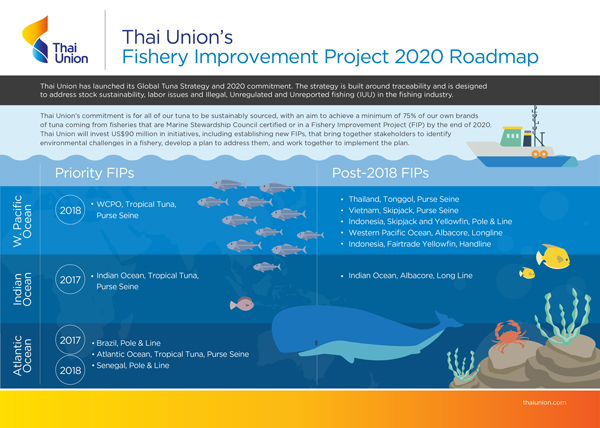Thai Union Commits to 100% Sustainable Tuna
- As part of its new tuna strategy, Thai Union commits to sourcing 100% of its branded tuna from fisheries that are either Marine Stewardship Council (MSC) certified, or engaged in Fishery Improvement Projects to move them towards MSC certification.
- The company aims to achieve a minimum of 75% by the end of 2020.
- A $90m investment in initiatives, including 11 new Fishery Improvement Projects, will increase the supply of sustainable tuna.
- The company has identified traceability as the key to sustainability and safe and legal labor in the tuna industry.
- Trials of new technology are designed to improve traceability and address the seafood industry’s most pressing issues.
13
As part of the new tuna strategy, Thai Union is investing $90m in initiatives that will increase the supply of sustainable tuna. This includes establishing 11 new Fishery Improvement Projects (FIPs) around the world.
“Tuna is the most readily available source of protein for millions of people around the world, and at least one billion depend on seafood for nourishment or employment. As a leader in the seafood industry, Thai Union has a responsibility to protect tuna stocks for
Thai Union defines sustainably sourced tuna as tuna from fisheries that are either already certified according to the standards of the Marine Stewardship Council (MSC) or are involved in
“Currently only 11 tuna fisheries globally are MSC certified, supplying just 14% of globally landed tuna.[2] Our commitment and strategy will have a positive impact on the entire industry by significantly increasing the supply of sustainable tuna available to the seafood processors, retailers and, ultimately, consumers,” said Darian McBain, Ph.D., Thai Union’s global director for sustainable development.
Thai Union’s new tuna commitment will apply to all of its tuna brands sold around the world, including Chicken of the Sea (North America), Genova (North America), John West (Northern Europe and Middle East), Mareblu (Italy), Petit Navire (France), and

Additional highlights from the new tuna strategy
Alongside investment in new FIPs, Thai Union has developed a number of other initiatives.
In addition, Thai Union commits to only sourcing from large-scale purse seiners that are registered on the ProActive Vessel Register[3].
[1] For more information on the MSC Fisheries Standard, visit https://www.msc.org/about-us/standards/fisheries-standard.
[2] Global Impacts Report 2016, Marine Stewardship Council, pages 9 and 44, https://www.msc.org/documents/environmental-enefits/global-impacts/msc-global-impacts-report-2016
[3] The ProActive Vessel Register (PVR) is run by the International Seafood Sustainability Foundation (ISSF). By registering on the PVR, tuna vessel owners demonstrate they are active participants in meaningful sustainability efforts and implement ISSF best practice.
[4] Results of the most recent audit were released on 21st November 2016 : http://iss-foundation.org/update-to-issf-participating-company-compliance-report-shows-improvement-across-all-measures/